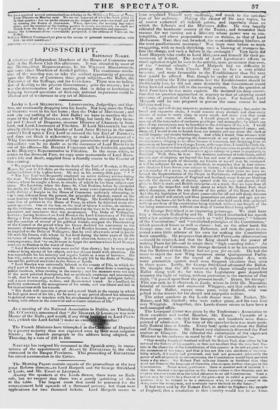Lucky is Lord MELBOURNE. Lieutenancies, Judgeships, and Gar- ters, are
continually dropping into his hands. Not long since the Duke of Gomm>: went to his lust home ; then the Puke of MONTROSE ; and now (to say nothing of the Irish Rolls) we have to mention the de- cease of the Earl of RoSSLYN, once a Whig, but lately the Tory (kne- es! anti Colonel of Dragoons, sinecure Director of Chancery in Scot- land, and Lord-Lieutenant of Fife:shire. If Lord MELBOURNE has not already (followna. up the blunder of Lord icrittl RussELL in the same county) fixed upon a Tory Lord to succeed the late Earl of RossLaN, and does not think it unbecoming to make a Lord-Lieutenant of a Whig Commoner—a gentleman of large possessions and great popula- rity—there can be no doubt as to the successor of Lord ROSSLYN in one of his offices—Mr. Roma FI nuusoN will be forthwith gazetted as his Majesty's Representative in Fifeshire. In the mean while, to return to the deceased Peer, we copy some memoranda of Lord Ross. roles life and death, supplied from a friendly source to the Courier of this evening.
'‘ We regret to have to announce the death of the Earl of Rossiya, at Dysart Huse, his seat in Fill:shire, on the morning of the 1Stb, of a severe attack of influenza followed by typhus fever. He was iu his seventy-fifth year. • • • The late Earl was frequently employed on active military service duriug the war. We believe the last command fie held was on the expedition to Wat- chmen, where he caught a fever, to attacks of which he has been subject ever since. his Lordship, when Sir James St. Clair Erskine, before he succeeded his uncle, the Earl of Russlyn, in 1805, for many years represented the Kirk- caldy district of Burghs in the House of Conumous, uniformly advocating, iu t m s very different from the present, the principles of freedom, seated on the same benches with his friend iFox and the Whigs. His Lordship followed the same line of polities in the House of Peers, in which he delivered many elo- quent speeches. One of the last, on the trial of Queen Caroline, on summing up the evidence, was, we remember, considered at the time to be the must argu 'mutative and conclusive that was pronounced. The Duke of Wellington, however, having bestowed on Lord Rosslyn the Lord-Lieutenaucy of Fileshire during a Tory Administratiou, and his Lordship having afterwards, nut with out the sanction of several of his political ft iends, accepted the Presidentship of the Council at the period when his Grace declared his conversion to the necessity of emancipating the Catholics, Lord Rosslyn became, it would appear, so attached to the Duke of Wellington, that he ever afterwards acted in pu:dic life with his Grace, with whom he has lived during the latter years of his life on.ternis of intimate friendship. It is well observed, however, by one of our contemporaries, that we ou4ht never to forget the services which Lord Rosalyn rendered to freedom iu the worst of times.'
"‘ Lord Russlyn's talents were more useful than showy ; but he never spoke without being master of his subject, and WAS always heard with attention. He was remarkable fur his industry and regular habits as a man of business. His lose will, unless we are greatly mistaken, be deeply felt by the Duke of Welling- ton and his political asseciates to the House of Lords. Lord Rossiya was universally beloved m the county of Fife, in which the chid* part of his estates is situated. lie never was absent from a meeting on public busiuess, when residing in the county ; and his manners were not only of the most polished description, but so uniformly courteous and unass.umiug to all, that he was a general favourite. lle was a kind and indulgent father, and a must ustworthy, zealous, and disinterested hiend. As a landlord, he perfectly understood the management of his estate, and was liberal and fair in his transactions with his tenants.
" llis death will occasion a great and general blank in the county in which he bad spout most of his life ; for he never at any period allowed his adherence to political views to interfere with his attachment to friends, or to prevent his mixing with others in the convivial and ordinary relations of life."


























 Previous page
Previous page